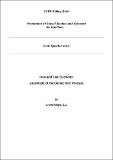Free and Fair Elections: Essentials of the Democratic Process

View/
Date
2011-04Author
Moyo, Anold
Type
BriefingLanguage
enItem Usage Stats
119
views
views
30
downloads
downloads
Abstract
This year, 2011, Zambia will be holding its fourth general elections and fifth presidential election since the country’s return to multi-party democracy in 1991. Although there have been contrasting assessments with regard to the freeness and fairness of these past elections, there has been general consensus that the elections have generally been peaceful. Nonetheless, this has not prevented the apprehension among people that usually characterises the period of elections. One seemingly banal question is always asked every time there is or there will be elections: will the elections be free and fair? The fate of most clichés such as the expression “free and fair elections” is that their significance tends to get weakened. People end up saying these expressions casually without consciously reflecting on their actual meaning. This may lead to a failure to fully appreciate that which the expression represents. Free and fair elections are a democratic imperative and an aspect of procedural justice, thus making the understanding of the concept of free and fair elections a necessity for a successful democratic process. This Policy Brief reflects on what is really meant by free and fair elections. The Brief will discuss the relationship between elections and democracy, between elections and human rights and between elections and development. It will also briefly examine Zambia’s past
electoral experiences as a means of drawing some lessons from these, as well as assess the conduciveness of the current political situation for free and fair elections to be held later this year. The Brief will then offer policy recommendations that the Jesuit Centre for Theological Reflection (JCTR) hopes will be instrumental in the formulation of a just legal framework for elections by the Government and in the facilitation of genuinely free and fair elections.
Description
Zambia’s endeavour to consolidate democracy and to fulfil its human rights obligations for the integral development of its citizens will not be fully consummated if the credibility of its electoral process is put into question each time there is an election. Despite the commendable strides the country has made in guaranteeing generally free and fair elections, citizens and civil society organisations still call for more reforms as they note various significant weaknesses in the current electoral system that pose a threat to their right to participate in their own governance through electing their representative in government in an enabling electoral environment.